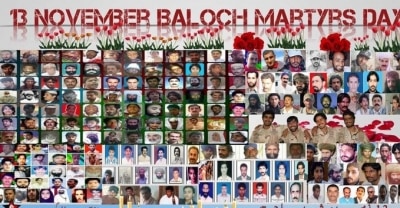By Ateet Sharma
New Delhi, Nov 13 : There are massive reserves of gas but no supply network for the locals. There are coal-fired power plants worth millions of dollars but still only a few have access to electricity. There are huge mineral resources, but foreigners come and exploit them. Theres a deep-sea port as well, but not under their control. There is life, but death squads snatch it. That pretty much sums up the life of people in Balochistan, the largest province in terms of area in Pakistan. As Baloch groups all over the world hold candlelight vigils, solidarity marches and rallies to observe the ‘Baloch Martyrs Day today, they seek urgent attention of the global community towards the atrocities being committed against them by the Pakistani forces and government.
“We will be wiped out soon. It has been happening since the 1970s and there’s hardly anything left in Balochistan now. The locals are struggling to survive. We have no hospital, no electricity, no education facilities, no water management, no economy, absolutely nothing at all,” Rana Ibrar Khalid, a Baloch journalist, tells IndiaNarrative.com in an exclusive chat.
There are massive reserves of gas but no supply network for the locals. There are coal-fired power plants worth millions of dollars but still only a few have access to electricity. There are huge mineral resources, but foreigners come and exploit them. There’s a deep-sea port as well, but not under their control. There is life, but death squads snatch it. That pretty much sums up the life of people in Balochistan, the largest province in terms of area in Pakistan. As Baloch groups all over the world hold candlelight vigils, solidarity marches and rallies to observe the ‘Baloch Martyrs Day’ today, they seek urgent attention of the global community towards the atrocities being committed against them by the Pakistani forces and government.
“We will be wiped out soon. It has been happening since the 1970s and there’s hardly anything left in Balochistan now. The locals are struggling to survive. We have no hospital, no electricity, no education facilities, no water management, no economy, absolutely nothing at all,” Rana Ibrar Khalid, a Baloch journalist, tells IndiaNarrative.com in an exclusive chat.
The Balochs have been facing death and discrimination at the hands of Pakistani authorities for decades. The current volatile political atmosphere in the country has seen the likes of Pakistan Muslim League-Nawaz (PML-N) vice-president Maryam Nawaz and Pakistan People’s Party (PPP) chief chairman Bilawal Bhutto Zardari traveling to the region last month and highlighting the Baloch ’cause’ in the Pakistan Democratic Movement’s rally. A Jamiat Ulema-i-Pakistan leader Maulana Shah Owais Noorani even demanded the creation of an “independent Balochistan” state. However, the locals know that their lives and fate will remain forever unchanged.
The man in charge of the country, Prime Minister Imran Khan, says that he is “aware” of the problems being faced by the people of Balochistan. He thinks that the China-Pakistan Economic Corridor (CPEC) will be a “game changer” for the locals. But, at the same time, the ‘Kaptaan’ of ‘naya Pakistan’ doesn’t give a hoot about the killings, enforced disappearances and the bloodbath taking place in the province every day or the Chinese which are fast outnumbering the locals in many pockets of the region.
“It is our misfortune that China is so deeply involved in Pakistan, particularly Pakistan-occupied Kashmir and Balochistan. Role of Baloch bureaucrats in this can’t be ruled out too. An industrial zone was announced at Gwadar but nothing has been done till now. The central project reservoir is almost empty,” says Khalid.
Last year, Pakistan had boasted of bringing multi-billion dollar projects to Balochistan, including the setting up of a state-of-the-art Saudi Aramco oil refinery in Gwadar. “The oil refinery project is the biggest investment project of Saudi Arabia in Pakistan,” Information Minister Fawad Chaudhry had announced. But, as it has panned out, the project hasn’t seen daylight.
While fight for survival continues for the ordinary Balochs, Pakistan’s National Accountability Bureau (NAB) has time and again revealed local officials and politicians benefiting massively from deals with foreign companies – the gold and copper deposits found at Reko Diq in Balochistan being a prime example.
And, all this while, people continue to go missing in Balochistan. The pain inflicted on the community by the Pakistani deep state is highlighted by international media on ‘missing persons’ and ‘martyrs day’ before they are left to fend for themselves again. It is just the hashtags on social media which change constantly – from #justiceforbramsh to #justiceforhayatbaloch to #justiceforshaheena.
As Balochistan National Party president Sardar Akhtar Mengal says, the Balochs have never been treated as equal citizens in Pakistan.
“Gulistan ko lahoo ki zaroorat pari, sab se pehlay hi gardan hamari kati… Phir bhi kehtay hain mujh say yeh ahle-chaman, yeh chaman hai hamara, tumhara nahi” (Whenever the country needed sacrifice, we were the first to offer our lives. Yet, our fellow countrymen tell us, this is their country and not ours),” said the top Baloch leader in Quetta a few weeks ago.
(This content is being carried under an arrangement with indianarrative.com)
Disclaimer: This story is auto-generated from IANS service.

